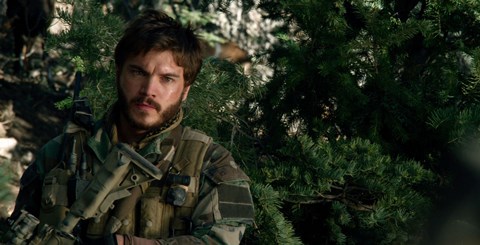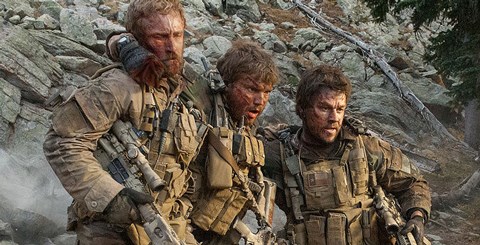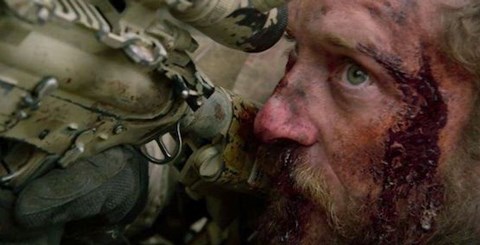Lone Survivor
Based on Marcus Luttrell's The New York Times best-selling true story of heroism, courage and resilience, Lone Survivor tells the incredible tale of Faced with an impossible moral decision, the small band is isolated from help and surrounded by a much larger force of Taliban ready for war. As they confront unthinkable odds together, the four men find reserves of strength and bravery as they stay in the fight to the finish.
"No matter how many times I get up and tell this story, or how many people read the book, it's nothing compared to how many people will watch this film. So my job is done. Mission complete," says Marcus Luttrell. Who wrote the book with Patrick Robinson.

Mark Wahlberg leads the cast as Marcus Luttrell, the author of the first-person memoir Lone Survivor, whose book has become a motivational resource for its lessons on how the power of the human spirit is tested when we are pushed beyond our mental and physical limits.
Duty and honour in the face of extreme adversity
This true story of duty and honour in the face of extreme adversity and the heroic deeds of fallen comrades caught filmmaker Peter Berg's attention when his production partner, Film 44's Sarah Aubrey, gave him a copy of the book and insisted that he read it. Although in production on his then-forthcoming blockbuster Hancock, Berg began to flip through it during a lunch break. After a few minutes, he was transfixed, locking the door to his trailer and reading the book cover to cover. Determined to win the rights and adapt Lone Survivor into a film, Berg became a man obsessed.
Berg admits that his choices in subject matter come from an attraction to themes that are common among people in sports and the military. He says that he's long been interested in the reasons why these men and women would put themselves in harm's way. Berg offers: "When I first read Marcus' book, what got me the most was the dilemma that these men faced: being compromised by three goat farmers and knowing that if they let them go there was a very good chance they were going to get into a dangerous gunfight with a lot of guys."
Finding a greater strength as a team
Inevitably, the SEALs' journey struck the themes that Berg has returned to over and over again in his projects. Says the writer/director: "This story is about working together for something bigger than our ego, bigger than our individuality. It's about coming together as a group-protecting each other, loving each other, looking out for each other-and finding a greater strength as a team than you could ever find as an individual. Marcus wrote a book that, as much as it's about 19 people being killed on a tragic day in Afghanistan, is about brotherhood, sacrifice and team commitment."
Berg and Aubrey reached out to Luttrell to discuss the possibility of adapting the SEALs' story into a film. "Early on in the process, Pete and I met Marcus in Austin," Aubrey explains. "He walked in the room and he is a mountain of a man, imposing under any circumstances, but knowing that he is also a Navy SEAL and has survived an incredible trial makes you give him a lot of weight when he speaks. He was very clear about wanting to honour the memory of the men who died alongside of him. We instantly knew that we had to get it just right, or there would be trouble. He was not going to let us do a half-baked version."
Luttrell appreciated the filmmaker's military-like attention to detail and guerrilla style of filmmaking, and insisted to Berg that he would only grant him rights to the story if Berg truly respected and honoured his brothers' sacrifice. Indeed, Luttrell hoped that audiences around the world would begin to understand the decisions made on that mountain. After a bonding experience over many beers, and a not-so-thinly-veiled threat that Berg would have to answer to more than 1000 SEALs if the director messed up the interpretation, Luttrell was on board.
Their ongoing talks led to a deeper friendship and, gradually, to discussions with many of the men and women in uniform who had been involved in Operation Red Wings and the rescue. "I spent quite a bit of time not just with Marcus, but I interviewed so many men and women," recalls Berg about his efforts to get the story right. "I feel like I've done my due diligence."

Pete went above and beyond
The former SEAL discusses why he chose Berg: "There were so many directors and studios that came in and wanted to make the movie, and I interviewed all of them. But when I saw Pete and talked to him, he's the one that I got that certain feeling about. He was the one I thought could get it done." Luttrell was impressed by the filmmaker's dedication. "Pete went above and beyond. He's done all his homework, studied it for years to get this right, and it paid off. You can tell somebody who puts the work in and you can tell somebody who didn't. He did, and I love him for it. He's a good man, and it's a privilege to have him in my life."
While Luttrell's book is a chronicle of many events, including his 1999 enlistment and training prior to his mission in 2005, Berg realised that the screen adaptation would need to concentrate on the more dramatic tale that unfolded once Luttrell was deployed to Afghanistan. His focus for the screenplay became the unbreakable camaraderie of the team members, their valour under fire and the tragic turn that forever changed the life of sniper, hospital corpsman and SEAL Luttrell.
While Berg knew that there would be significant pressure to get their story just right, he couldn't anticipate the depths to which he would become emotionally involved in the lives of these elite warriors and their relatives. He pauses: "There was pressure from the families, the SEAL community, and then Marcus-whether I liked it or not- announced that he was moving into my house for a month. He was going to make sure I understood what happened on that mountain."
As he delved further into the project, Berg knew it would prove invaluable to sit with those most affected by the loss of their loved ones. He offers: "My research started with meeting the families of the SEALs who were killed. I went to New York and met the Murphys. I went to Colorado and met the Dietzes, and I went to Northern California and met the Axelsons. After spending time with them, you realise that these kids were the best and the brightest; they were the stars of the families. The grief and the wounds are still very raw. You would have to be inhuman to not feel the responsibility when that kind of grief gets shared with you."

Autopsy report from the military
The writer/director is the first to admit that there were times during preproduction when he realised that this film would be his most difficult endeavour to date. He gives: "One of these moments was when I visited the Dietz home and Mr Dietz took me to Danny's bedroom, which he's kept. It was the room of a teenage boy, but he had built this glass case and inside was Danny's uniform with the bullet holes in it and blood on it, as well as his gun, helmet and boots. Mr Dietz took a piece of paper and started reading it; it was the autopsy report from the military. As he was reading, tears started hitting the piece of paper. When he finished, he put the paper down on my lap and said: 'That's who my son was. That's how tough my son was. You make sure you get that right.'"
Berg reflects: "You can only imagine how much it means to these families to have their sons' story continue and legacy preserved. It is something that I am very proud of."
Because of his long-standing ties with members of the armed services, Berg, in early 2010, was on his way to the Middle East and embedded with a SEAL platoon in Iraq near the Syrian border. He spent a month at a small desert base with a team of 15 as he began the arduous task of crafting the script. There, he was offered a window into their world as he accompanied them on night patrols and observed how the men operated.
"I don't know if a SEAL platoon embed would be possible today," says Berg. "This was several years ago, and everyone was very accommodating. They asked me to not reveal certain tactics, to respect the reasons why classified information stayed that way. We do that in the film."
Being given the type of access that one would only imagine a seasoned journalist would have was a privilege and honour that Berg did not take lightly. He patently dismisses a familiar misconception: "One of the things that I've come to appreciate about Navy SEALs is that they're not superhuman guys. They're not necessarily the biggest or the fastest or the strongest. But the common thread that they all share is character. They all have indomitable will and a very real sense of honour." The filmmaker extends his respect to the Pashtun villagers who saved Luttrell.
That guy is a warrior
Discussing Luttrell's saviour, Berg says: "All the things Marcus was talking about-discipline, a code of honour, dedication and commitment to a belief system-Gulab had all of these things. You talk about the will of the warrior? That guy is a warrior."
Although Lone Survivor takes the creative liberties necessary to make a film, it is committed to preserving the essential experience of what these men endured on their mission. It is a realistic, timeless and isolated portrait of the sacrifices that one small band of warriors made - and how one survived to tell their tale.
Read more about Lone Survivor and other new releases at www.writingstudio.co.za























